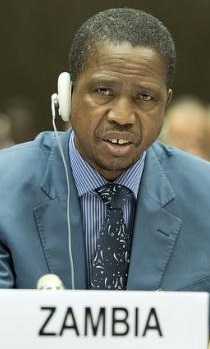The President Who Will Change Zambia
 |
| H.E. Edgar Lungu of Zambia |
The president who will change Zambia must have ascendant presidential qualities; be a great leader; and must have the judgment to gather other like-minded individuals to help him turn vision into viable projects.
Let us begin with the first principle: Not just anyone can be president; ertain qualities make some more qualified than others to be presidents. Often, we have unlikely people ruling nations due to political connection, kinship ties, political dynasties which feel they are entitled to rule, financial clout and academic accomplishments among others. However, they may not be good presidents themselves.
It takes a tough, smart and driven individual to run the affairs of a nation. The legacy that most presidents have left on Africa is dismal performance in terms of economic progress and critical innovations in sciences and technology. Some of them have remained presidents too long and have no fresh ideas to innovate. They keep the status quo, eliminate credible aspirants and groom dunderheads who sustain their leadership.
But what about countries like Zambia where a level of democratic, political change has been maintained for a relatively long while? Why did Kaunda, Chiluba, Mwanawasa, Banda, Sata and even Lungu fail to move Zambia a step to its pre-independence economic thrust? While we cannot blame everything on these presidents, we know that the success or failure of a nation is predicated upon the performance of its government. That would have meant each president bringing at least one fundamental change to Zambia. Kaunda brought independence to Zambia, Chiluba democracy, and Mwanawasa end to government corruption. And the trend ends right there. From Banda, to Sata to the current incumbent, things have neither improved nor have been sustained. Indices are steeper than before.
Zambia requires a revolution of a sort. It needs a president who is courageous to feel the compunctions of the people, especially the poor who have no guarantee for survival and dignity. It does not matter his or her tribe, education, political experience, size or shape. Zambia’s biggest challenge is the poverty problem. There will be only one winner, a leader who breaks the back of poverty and brings Zambia out of its poverty quagmire. Zambians should not be preoccupied with what the best political party is; but rather, who will give sound methods to end poverty. This calls for leadership. The best president should be one with the right policies, strategies and the leadership acumen required to lead the nation into eliminating poverty.
Second, the person who will change Zambia must be a leader. Not every president is a leader.Zambia should look for a man or woman who recognize that help can come from anywhere. The president must craft a vision and select the best men and women to help realize it. If such men cannot be found among the elected officials, they should be sought from other sectors. There are people in business, academia, church, civil society, media and in the Diaspora who can provide excellent leadership in Zambia. The president must identify and involve them. All the president need is to provide them with a vision – of where he or she wants to take the country and allow these brains to work.
Third, there could be some who may not run for presidency in Zambia, but they are great leaders. Ideally, only one person can occupy the office of the president at any time. The electorate should exercise good judgment in electing such a person. The president should understand that there are just as good men and women out there who were not elected, did not run but can rule the nation. These, the president must search for and involve them. If they are already Members of Parliament, they should be assigned ministries where they can function effectively.
When good people fail to run, mediocre people will run and be elected. In Zambia, there are many educated people who are improving nothing. We have more people with gigantic credentials who cannot open an email, and let alone create technologies that can shape Zambia’s economic landscape. But all this can change when a president who is also a leader can see the value of prioritizing scarce resources into projects that can bear dividends for the people. He or she can tap into those elected officials who have the knowledge and drive as well as from non-elected officials who can make things happen. The first job of the president is to select a think-tank of various professionals from all walks of life (at home and abroad) and task them with the business of growing the economy and eliminating poverty. Everything else will flow from this reservoir.
In summary, a president who is going to change Zambia must be a change agent – he or she must understand that change is inevitable for Zambia. He or she must not be afraid of upsetting status quo – he or she must engineer, not maintain, change. He or she must have the talent and character to create conditions necessary for progressive infrastructures. He or she must do everything to gather a reservoir of Zambian thinkers (professionals and experts) who will help to shape Zambia’s economic policy; and actually put them to work.
By Charles Mwewa
Charles Mwewa, (B.A Law – Paralegal Studies; B.A. English; DipBM) is a Professor of Law at CDI College in Downtown Toronto, Canada. He is a prolific author whose published works include The Seven Laws of Influence and Struggles of My People.
